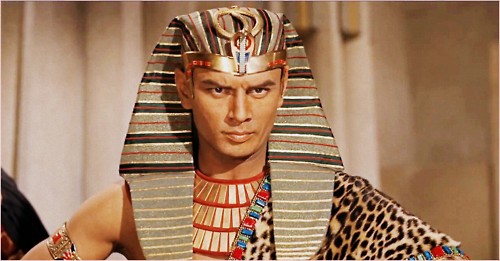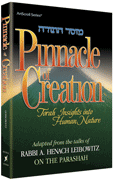
Pharaoh is universally portrayed as evil personified. But a careful reading of Scripture reveals actions that offer keen insight in becoming Godly --- including to one's fellow
“I [Pharaoh] have sinned this time, the Lord is the righteous one, and I and my people are the wicked ones.”— Exodus 9:27
Hailstones rained down from the heavens, destroying every living thing left out in the Egyptian fields — plants, animals, and even the Egyptians themselves. As a result, Pharaoh realized the error of his ways and admitted the omnipotence and truth of the Divine.
The Talmudic commentary, Riva, explains why this, the seventh plague, had a special impact on Pharaoh: the Almighty had warned the Egyptians to save their cattle by bringing in all their animals
from the fields. "The Divine is the righteous one because He showed kindness to us by warning us about our possessions," Pharaoh reasoned, "and we are the wicked ones because we did not pay attention to His beneficial words."
PHARAOH'S REALIZATION
The first six plagues were obvious manifestations of His might. Each time, Moses had warned Pharaoh of the upcoming catastrophe and immediately afterwards the miraculous plague occurred, exactly as Moses had foretold. Any sensible person, especially the ruler of a country, would have feared for his life and the survival of his country, and cknowledged his mistake.
Yet Pharaoh had been unmoved. Now he suddenly admitted his error. Why specifically did the plague of hail, with its special warning and advice, make Pharaoh realize the wickedness of his ways more than the awe-inspiring and punishing miracles that preceded it?
As with any living creature, man's most basic instinct is that of self-preservation. Humans naturally fear, and react to, any threat to one's life or health. Yet the human being is endowed by the Divine with an even greater, more powerful feeling: that of hakoras hatov — gratitude.
Recognition and appreciation of kindness can be a more powerful motivator than even concern for one's safety. If we analyze the Riva's observation carefully, we will notice that Pharaoh was impressed by the Divine's benevolent words and His kindness towards the Egyptian people in warning them and advising them to save their possessions.
Pharaoh — the cruel leader who enslaved an entire nation, bathed in the blood of Jewish children, and had every Jewish baby boy mercilessly drowned in the Nile — was, despite his inhuman cruelty, influenced by the Divine's kindness even when all the fearsome plagues that preceded it had failed to have an impact upon him.
Mastering this lesson in man's appreciation of kindness has a practical application. It is certainly useful when we reach out to others and try to bring them closer to Him. At times we may find that pointing out the Divine's kindness to the entire world as well as to each individual can be a stronger impetus to bring one back to his heritage than many lectures on, say, reward and punishment.
MOTIVATING OURSELVES
However, before we reach outward, we must first reach inward. To bring ourselves closer to the Divine, we can awaken feelings of love for Him by contemplating the unending flow of kindness that He showers upon us.
From the minute of our birth, through our entire lives, at every moment and with every breath we take, we are further indebted to Him for keeping us alive, granting us our health, our families, our spiritual accomplishments, as well as our material possessions.
The trait of gratitude was able to bring the cruel, wicked tyrant, Pharaoh, to acknowledge His righteousness even when six devastating plagues had failed to do so. How much more can our feelings of gratitude accomplish for us, to bring us ever closer to our Father in Heaven!
| INSPIRED BY THIS ARTICLE? BUY THE BOOK ... | |
 at a discount by clicking HERE . at a discount by clicking HERE . | |
Comment by clicking here.
One of America's senior Torah sages, the late Rabbi A. Henach Leibowitz was the dean of the Rabbinical Seminary of America, in Queens, New York for more than 50 years. The institution has branches and affiliates all across North America and Israel.
This article was prepared by two of the sage's disciples, Rabbi Aryeh Striks and Rabbi Shimon Zehnwirth, and excerpted from the just released book, "Pinnacle of Creation: Torah insights into human nature".
Truth — The Key to Gratitude
Previously:
Money matters ... Or does it? Wise words to consider during trying times
The Power of Spiritual Inertia
Our Immutable Noble Essence
The 'living dead' are all around us
We have the power to alter another's destiny — use it well
The Crowning Glory of Creation
The Divine's eternal, unconditional love
Perverting sincerity
Do 'clothes make the man'?
Divine vindictiveness?


 Contact The Editor
Contact The Editor
 Articles By This Author
Articles By This Author
